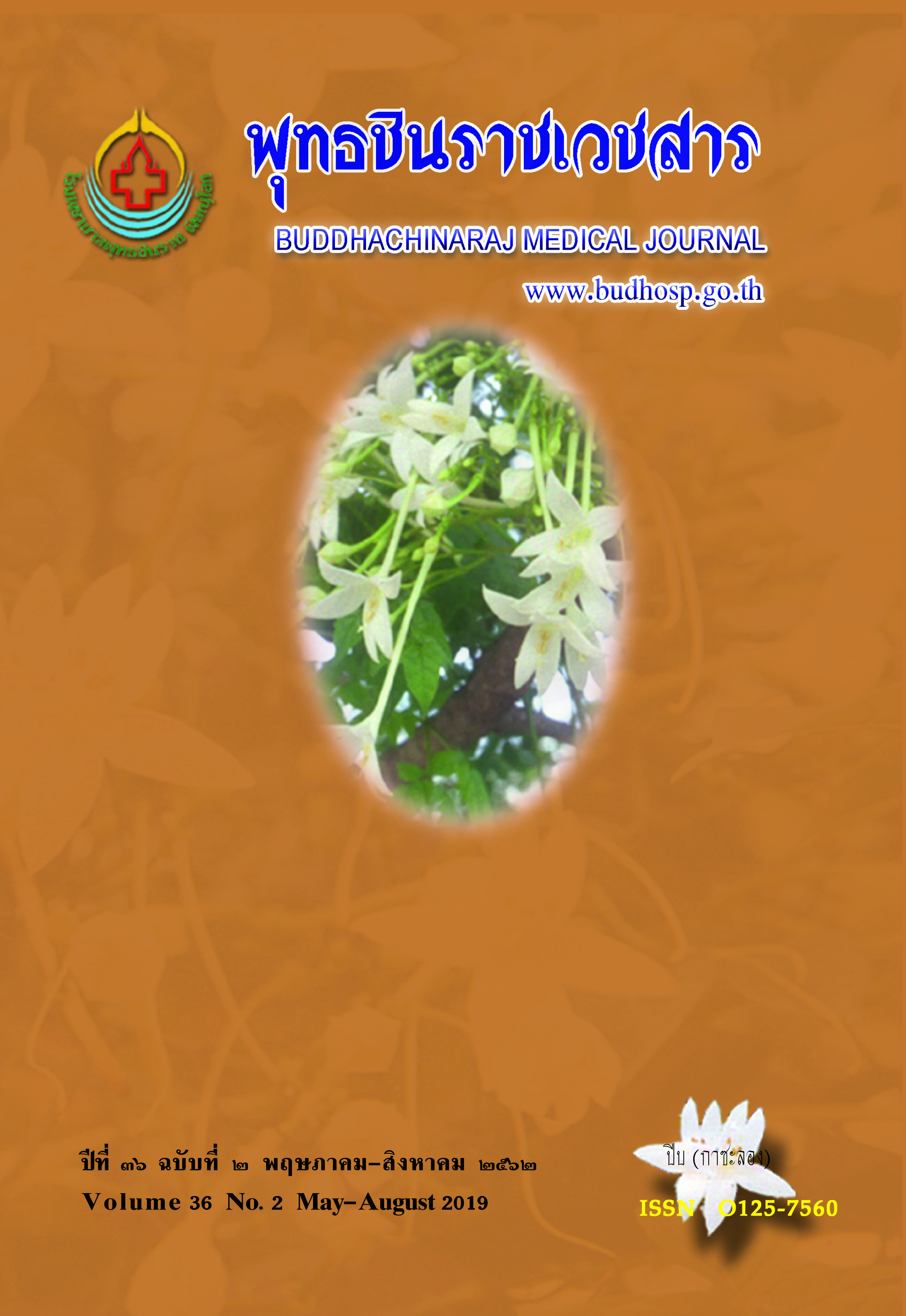พฤติกรรมการอ่านหนังสือของนิสิตแพทย์ต่อผลสัมฤทธิ์ต่อการเรียน
คำสำคัญ:
นิสิตแพทย์, พฤติกรรมการอ่านหนังสือ, ผลสัมฤทธิ์ทางการเรียนบทคัดย่อ
การอ่านหนังสือเป็นสิ่งสำคัญต่อการเรียนรู้และผลสัมฤทธิ์ทางการเรียนของนิสิตแพทย์ การศึกษาแบบ prospective cohort study นี้ มีวัตถุประสงค์เพื่อสำรวจพฤติกรรมการอ่านหนังสือต่อผลการเรียนเพื่อให้เกิด ผลสัมฤทธิ์ทางการศึกษา โดยใช้แบบสอบถาม ร่วมกับผลการเรียนรายวิชาสุขภาพและโรคของเด็กแรกเกิดจนถึง วัยรุ่น 1-4 ศึกษาในนิสิตแพทย์ชั้นปี 4-6 ที่ขึ้นปฏิบัติงานภาควิชากุมารเวชศาสตร์ โรงพยาบาลมหาวิทยาลัยนเรศวร ปีการศึกษา 2560 จำนวนทั้งหมด 90 คน เป็นนิสิตชาย จำนวน 40 คน (44.4%) และนิสิตหญิง จำนวน 50 คน (55.6%) พบว่า ช่วงเวลาในการอ่านหนังสือของนิสิตแพทย์เป็นช่วงหลังเที่ยงคืน (00.30-06.00 น.) จำนวน 48 คน คิดเป็น ร้อยละ 53.3 ลักษณะการอ่าน เป็นการจดรายละเอียดย่อ ร้อยละ 43.2 อ่านหนังสือคนเดียว ร้อยละ 29.6 และ อ่านหนังสือกับเพื่อน ร้อยละ 12.5 ไม่มีความสัมพันธ์ระหว่างช่วงเวลาในการอ่านหนังสือและลักษณะของการอ่าน หนังสือกับผลสัมฤทธิ์ทางการเรียนรายวิชาสุขภาพและโรคของเด็กแรกเกิดจนถึงวัยรุ่น 1-4 สรุปคือ นิสิตแพทย์ ส่วนมากใช้เวลาในการอ่านหนังสือช่วงหลังเที่ยงคืน โดยใช้วิธีการจดแบบย่อในการช่วยจำบทเรียน และพฤติกรรม การอ่านไม่มีความสัมพันธ์กับผลสัมฤทธิ์ทางการเรียน
เอกสารอ้างอิง
2. Ohman A, Flykt A, Esteves F. Emotion drives attention: Detecting the snake in the grass. J Exp Psychol Gen 2001; 130(3):466-78.
3. Sarter M, Gehring WJ., Kozak R. More attention must be paid: The neurobiology of attentional effort. Brain Res Rev 2006;51(2):145-60.
4. Baddeley AD. The influence of acoustic and semantic similarity on long-term memory for word sequences. Q J Exp Psychol 1966;18(4):302-9.
5. Anderson RC, Hidde JL. Imagery and sentence learning. J Educ Psychol 1971;62:526-30.
6. Blanchard J, Mikkelson V. Underlining performance outcomes in expository text. J Educ Res 1987; 80:197-201.
7. Armbruster BB, Anderson TH., Ostertag J. Does text structure/summarization instruction facilitate learning from expository text ?. Read Res Q 1987; 22:331-46.
8. Ellenbogen JM, Hulbert JC, Stickgold R, Dinges DF., Thompson-Schill SL. Interfering with theories of sleep and memory:sleep, declarative memory, and associative interference. Curr Biol 2006; 16(13):1290-4.
9. Diekelmann S, Wilhelm I, Born J. The whats and whens of sleep-dependent memory consolidation. Sleep Med Rev 2009; 13(5):309-21.
10. Marshall L, Born J. The contribution of sleep to hippocampus-dependent memory consolidation. Trends Cogn Sci 2007; 11 (10): 442-50.
11. Diekelmann S, Born J. The memory function of sleep. Nat Rev Neurosci 2010; 11(2):114-26.
12. Small GW, Silverman DH, Siddarth P, Ercoli LM, Miller KJ, Lavretsky H, et al. Effects of a 14-day healthy longevity lifestyle program on cognition and brain function. Am J Geriatr Psychiatry 2006; 14(6):538-45.
13. Fowler RL, Barker, A-S. Effectiveness of highlighting for retention of text material. J App Psychol 1974; 59(3): 358-64.
14. Hoon PW. Efficacy of three common study methods. Psychol Rep 1974; 35(3):1057-8.
15. Shapiro AM, Waters DL. An investigation of the cognitive processes underlying the keyword method of foreign vocabulary learning. Lang Teach Res 2005; 9(2):129-46.
16. Leutner D, Leopold C, Sumfleth E. Cognitive load and science text comprehension: Effects of drawing and mentally imagining text content. Comput Human Behav 2009;25(2):284-9.
17. Farrand P, Hussain F, Hennessy E. The Efficacy of the Mindmap Study Technique. Med Educ 2002; 36: 426-31.
18. Ozubko JD, Macleod CM. The production effect in memory: evidence that distinctiveness underlies the benefit. J Exp Psychol Learn Mem Cogn 2010; 36(6):1543-7.
19. Millis KK, King A. Rereading strategically:The Influences of comprehension ability and a prior reading on the memory for expository text. Read Psychol 2001; 22(1):41-65.
20. Callender AA, McDaniel MA. The limited benefits of rereading educational texts. Contemp Educ Psychol 2009; 34(1):30-41.
21. Rasch B, Born J. About sleep's role in memory. Physiol Rev 2013; 93(2):681-766.
22. Phihal W, Born J. Effects of early and late nocturnal sleep on declarative and procedural memory. J Cog Neurosci 1997;9:534-547.
23. Patrick G. On the effects of loss of sleep. Psychol Rev 1896; 3:468-83.






